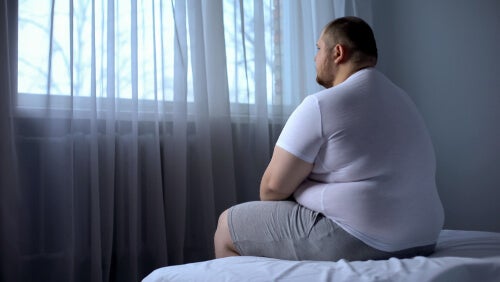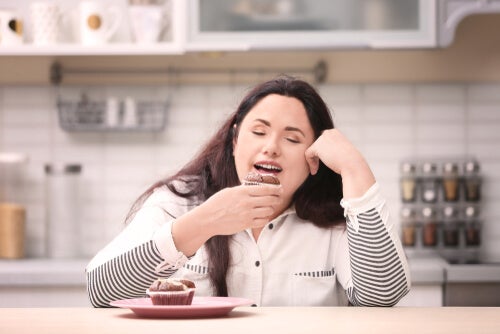Obesity and Guilt - Are You Truly at Fault?

Obesity and guilt go hand in hand. Do any of these expressions sound familiar? “I’ll begin tomorrow”, “This is the last one”, “Never again”, “I can’t go on like this”, “I’m getting fatter”, “I have to change my habits”, “I’m gaining weight”, and “Why can’t I stop getting fat!”
These are phrases that you may tell yourself daily because our culture makes you believe that you and only you are to blame for your excess weight. You think you’re solely responsible for your body and you value yourself exclusively on what your body looks like. And you feel frustrated because nobody notices your many wonderful attributes or they don’t sufficiently recognize them.
You may feel that you’re worse off by having a body that’s different from what the media tells you. You know you have to lose weight because you’re beginning to suffer from health problems. Many things can pressure you into changing your body.
“I’m just through with the guilt. So this is what I’m going to do, I’m going to finish this pizza, and then we’re going to go watch the soccer game, and tomorrow we’re going to go on a little date and buy ourselves some bigger jeans.”
-Elizabeth Gilbert-
Obesity and guilt – Pressure and despair
There’s always that one day in which you begin to despair because you think you need to change. Many reasons begin to flood your mind and, at that precise moment, you feel truly bad and gross. You wonder why you let it get out of hand to begin with, so you turn your accusing finger towards yourself. Deep inside, you’re convinced that changing is easy and that all you need is willpower.
This kind of despair makes you no longer accept yourself and your body and you decide that you need an immediate change due to the enormous responsibility you feel to be “eye candy”. There, you acquire a method that meets two conditions:
- Punishing yourself for not having done something before.
- The thought of achieving spectacular short term results.
The worst part is that these methods do exist, especially the ones that have to do with the first.
For instance, there are heartless/dumb people who create these types of weight loss programs and promote them as healthy options. These people, who are usually paid celebrities, tell you that you must make sacrifice sto be “beautiful”. So, you must adopt a hypocaloric diet and do intense exercise routines, and also exercise absolute self-control, blah, blah, blah… For sure you’ve heard them!
Restrictions are dumb…

The discomfort caused by the body you inhabit is unbearable. You become desperate and immerse yourself in a hard process that doesn’t satisfy you. Of course it doesn’t, because it’s unsustainable. It’s impossible and you can’t stick to it. Then, the desperation to take off this pressure makes the process of change even more rigid. It increases the guilt over your obesity. The discomfort becomes so hard that it goes beyond physical pain.
Add to the above how your self-esteem erodes little by little, almost without you realizing it. You take one look at yourself in the mirror and truly despise what you see. You no longer feel bad about your body, now you’re also angry at your mind. But do you know why? It’s all because:
- Every day, you value yourself only by the shape of your body as if it was all that matters about you.
- Thus, every day, you tell yourself that you have a shitty body.
- And every day you try to change it so it becomes what you want it to be or, more accurately, as you’ve heard it should be.
- Then again, every time you try to change it, you do it in an unbearable and unsustainable way. It makes you feel terrible because it becomes an exercise in self-destruction.
… so you eat
- Obviously, you’re unable to submit to such rigid discipline. However, you don’t realize it. All you can think is you can’t do it because you’re not strong enough because you’re just not good enough.
- In addition, you feel guilty every day because you’re not able to change as per what you think is doable. You follow those misleading messages of “You can do anything you set your mind to”.
- Every day, you learn that binging on food wins the battle even when you try not to do it. You don’t realize that you need it to relieve some of your dissatisfaction, to calm your anxiety. Of course, you’re dissatisfied because any relief you do get is quite brief.
- Thus, every day you send yourself the message that you’re going to lose. And you think you’re losing because of you. Because you’re not capable and aren’t good enough. You tell yourself that you’re weak, that you can’t, that you’re crap. That you’re not capable and never will be. In short, you tell yourself that you’re a loser.
Then, you need to feel better and the discomfort becomes too difficult to bear. So, you fall off the wagon and eat everything you haven’t eaten in the past few days. Unfortunately, you do so with anxiety and discomfort, without joy. This is what binge eating is about and, although it’s physically unhealthy, it does give you mental relief while it lasts.
The binge quenches the anxiety generated by the unbearable process of change. Then, the cycle begins again. There’s pressure, despair, excessive control, dissatisfaction, binging, and guilt.
Guilt and obesity – Are you truly at fault?

Unfortunately, the binging relief doesn’t last long and now you feel truly guilty about your obesity. Why weren’t you able to “do what needs to be done” to get back that bikini body and eliminate all the pressure and dissatisfaction that having yours brings about. As if your body was to blame for everything …
So, the vicious circle begins all over again and you feel pressured and highly motivated to change. Then, you’ll again find and adopt an unsustainable method that you won’t be able to keep up with. Once again, you’ll binge to relieve that state of brutal dissatisfaction. Then again, the guilt will make an appearance and you’ll once again fall into the trap. Except, the more you fall, the deeper the levels of dissatisfaction you’ll encounter.
It’s all because your culture made you believe that you’re at fault for your weight gain. You feel so responsible and the pressure you feel is brutal. It leads you to continue to seek unsustainable methods that only aggravate your situation. Thus, the solution begins as soon as you break this vicious circle. Put aside some momentum and take a thoughtful, well-adjusted, realistic approach. One in which going back doesn’t mean beginning from scratch. One in which you can lose but it won’t be everything you’ve gained.
You must have a critical spirit that will give you control over your life and your decisions. An independent attitude apart from the mass cognitive dissonance.
How to break the obesity and guilt cycle
Breaking the cycle is about eliminating pressure. To do so, you must create a realistic story about you and the responsibility you have over your body, its shape, and its relevance in your life. At the same time, you must have a critical spirit towards that society in order to discard toxic stories that could distort your inner dialogue.
In addition, you have to value yourself beyond your body or what you don’t like about it. You must understand that you’re good enough the way you are. This way, your plan won’t turn against your self-esteem if you don’t fulfill it.
Only from this peace of mind will you be able to enter a process of kind, healthy, progressive, and sustainable change. A comprehensive model that, in addition to teaching you to eat properly, will also work on other areas to help you feel better.
This is because you’ll eliminate the pressure, despair, and dissatisfaction you may hace. You won’t need food as your only source of well-being and you won’t feel guilty about eating because you’ll know that it sometimes has a protective effect and it makes sense. There won’t be room for binging and, therefore, no guilt.
Guilt over obesity is something society makes you feel. Don’t fall for it.
Obesity and guilt go hand in hand. Do any of these expressions sound familiar? “I’ll begin tomorrow”, “This is the last one”, “Never again”, “I can’t go on like this”, “I’m getting fatter”, “I have to change my habits”, “I’m gaining weight”, and “Why can’t I stop getting fat!”
These are phrases that you may tell yourself daily because our culture makes you believe that you and only you are to blame for your excess weight. You think you’re solely responsible for your body and you value yourself exclusively on what your body looks like. And you feel frustrated because nobody notices your many wonderful attributes or they don’t sufficiently recognize them.
You may feel that you’re worse off by having a body that’s different from what the media tells you. You know you have to lose weight because you’re beginning to suffer from health problems. Many things can pressure you into changing your body.
“I’m just through with the guilt. So this is what I’m going to do, I’m going to finish this pizza, and then we’re going to go watch the soccer game, and tomorrow we’re going to go on a little date and buy ourselves some bigger jeans.”
-Elizabeth Gilbert-
Obesity and guilt – Pressure and despair
There’s always that one day in which you begin to despair because you think you need to change. Many reasons begin to flood your mind and, at that precise moment, you feel truly bad and gross. You wonder why you let it get out of hand to begin with, so you turn your accusing finger towards yourself. Deep inside, you’re convinced that changing is easy and that all you need is willpower.
This kind of despair makes you no longer accept yourself and your body and you decide that you need an immediate change due to the enormous responsibility you feel to be “eye candy”. There, you acquire a method that meets two conditions:
- Punishing yourself for not having done something before.
- The thought of achieving spectacular short term results.
The worst part is that these methods do exist, especially the ones that have to do with the first.
For instance, there are heartless/dumb people who create these types of weight loss programs and promote them as healthy options. These people, who are usually paid celebrities, tell you that you must make sacrifice sto be “beautiful”. So, you must adopt a hypocaloric diet and do intense exercise routines, and also exercise absolute self-control, blah, blah, blah… For sure you’ve heard them!
Restrictions are dumb…

The discomfort caused by the body you inhabit is unbearable. You become desperate and immerse yourself in a hard process that doesn’t satisfy you. Of course it doesn’t, because it’s unsustainable. It’s impossible and you can’t stick to it. Then, the desperation to take off this pressure makes the process of change even more rigid. It increases the guilt over your obesity. The discomfort becomes so hard that it goes beyond physical pain.
Add to the above how your self-esteem erodes little by little, almost without you realizing it. You take one look at yourself in the mirror and truly despise what you see. You no longer feel bad about your body, now you’re also angry at your mind. But do you know why? It’s all because:
- Every day, you value yourself only by the shape of your body as if it was all that matters about you.
- Thus, every day, you tell yourself that you have a shitty body.
- And every day you try to change it so it becomes what you want it to be or, more accurately, as you’ve heard it should be.
- Then again, every time you try to change it, you do it in an unbearable and unsustainable way. It makes you feel terrible because it becomes an exercise in self-destruction.
… so you eat
- Obviously, you’re unable to submit to such rigid discipline. However, you don’t realize it. All you can think is you can’t do it because you’re not strong enough because you’re just not good enough.
- In addition, you feel guilty every day because you’re not able to change as per what you think is doable. You follow those misleading messages of “You can do anything you set your mind to”.
- Every day, you learn that binging on food wins the battle even when you try not to do it. You don’t realize that you need it to relieve some of your dissatisfaction, to calm your anxiety. Of course, you’re dissatisfied because any relief you do get is quite brief.
- Thus, every day you send yourself the message that you’re going to lose. And you think you’re losing because of you. Because you’re not capable and aren’t good enough. You tell yourself that you’re weak, that you can’t, that you’re crap. That you’re not capable and never will be. In short, you tell yourself that you’re a loser.
Then, you need to feel better and the discomfort becomes too difficult to bear. So, you fall off the wagon and eat everything you haven’t eaten in the past few days. Unfortunately, you do so with anxiety and discomfort, without joy. This is what binge eating is about and, although it’s physically unhealthy, it does give you mental relief while it lasts.
The binge quenches the anxiety generated by the unbearable process of change. Then, the cycle begins again. There’s pressure, despair, excessive control, dissatisfaction, binging, and guilt.
Guilt and obesity – Are you truly at fault?

Unfortunately, the binging relief doesn’t last long and now you feel truly guilty about your obesity. Why weren’t you able to “do what needs to be done” to get back that bikini body and eliminate all the pressure and dissatisfaction that having yours brings about. As if your body was to blame for everything …
So, the vicious circle begins all over again and you feel pressured and highly motivated to change. Then, you’ll again find and adopt an unsustainable method that you won’t be able to keep up with. Once again, you’ll binge to relieve that state of brutal dissatisfaction. Then again, the guilt will make an appearance and you’ll once again fall into the trap. Except, the more you fall, the deeper the levels of dissatisfaction you’ll encounter.
It’s all because your culture made you believe that you’re at fault for your weight gain. You feel so responsible and the pressure you feel is brutal. It leads you to continue to seek unsustainable methods that only aggravate your situation. Thus, the solution begins as soon as you break this vicious circle. Put aside some momentum and take a thoughtful, well-adjusted, realistic approach. One in which going back doesn’t mean beginning from scratch. One in which you can lose but it won’t be everything you’ve gained.
You must have a critical spirit that will give you control over your life and your decisions. An independent attitude apart from the mass cognitive dissonance.
How to break the obesity and guilt cycle
Breaking the cycle is about eliminating pressure. To do so, you must create a realistic story about you and the responsibility you have over your body, its shape, and its relevance in your life. At the same time, you must have a critical spirit towards that society in order to discard toxic stories that could distort your inner dialogue.
In addition, you have to value yourself beyond your body or what you don’t like about it. You must understand that you’re good enough the way you are. This way, your plan won’t turn against your self-esteem if you don’t fulfill it.
Only from this peace of mind will you be able to enter a process of kind, healthy, progressive, and sustainable change. A comprehensive model that, in addition to teaching you to eat properly, will also work on other areas to help you feel better.
This is because you’ll eliminate the pressure, despair, and dissatisfaction you may hace. You won’t need food as your only source of well-being and you won’t feel guilty about eating because you’ll know that it sometimes has a protective effect and it makes sense. There won’t be room for binging and, therefore, no guilt.
Guilt over obesity is something society makes you feel. Don’t fall for it.
All cited sources were thoroughly reviewed by our team to ensure their quality, reliability, currency, and validity. The bibliography of this article was considered reliable and of academic or scientific accuracy.
Álvarez Gordillo, G. C., Cruz Sánchez, M., Nigh Nielsen, R. B., Tuñón Pablos, E. & Villaseñor Farías, M. (2013). Sobrepeso y obesidad: una propuesta de abordaje desde la sociología. Región y sociedad, 25(57): 165-201. Consultado el 30/06/2019. Recuperado de: www.scielo.org.mx/pdf/regsoc/v25n57/v25n57a6.pdf
Fulgencio Juárez, M., Garciduenas Gallegos, D., Padros Blázquez, F. & Navarro Contreras, G. (2016). Propiedades psicométricas de la Escala de Culpa por Obesidad o Sobrepeso para Niños y Adolescentes (ECOSNA). Nutr. Hosp., 33(2): 239-244. Consultado el 30/06/2019. Recuperado de: http://scielo.isciii.es/scielo.php?script=sci_abstract&pid=S0212-16112016000200008
Tamayo Lopera, D. & Restrepo M. (2014). Aspectos psicológicos de la obesidad. Revista de Psicología Universidad de Antioquia, 6(1): 91-112. Consultado el 30/06/2019. Recuperado de: https://dialnet.unirioja.es/servlet/articulo?codigo=4947506
This text is provided for informational purposes only and does not replace consultation with a professional. If in doubt, consult your specialist.







